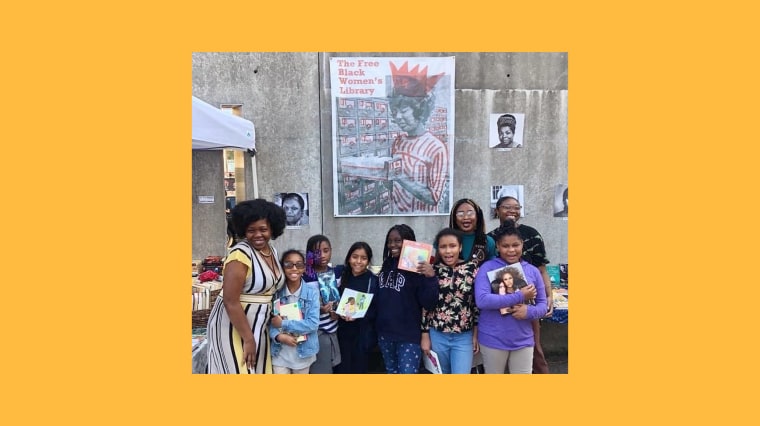In its early days in 2015, the Free Black Women’s Library could be found on the steps of a Brooklyn brownstone. OlaRonke Akinmowo would lug at least 100 books by Black women authors to a stoop and invite community members to trade a book by a Black woman author.
It was a simple community-building, social art project then, but Akinmowo dreamed that one day this library would have a permanent home — both in a building and on wheels. Nearly six years later, that dream will finally become a reality. A GoFundMe campaign for the project raised more than $100,000 in just two months.
“I was humbled and blown away and surprised," she said. "I was feeling really affirmed, like, ‘People really believe in this project and think it’s a good idea!’ I want to make people proud. The fact that I was able to raise it in such a short amount of time is something I’m super grateful for.”
With the new funding, Akinmowo said she is now looking for the perfect space in Brooklyn to house the library and a van or truck to serve as a "bookmobile" to transport it far and wide. She said she hopes to secure both by the end of the summer.
Akinmowo said this dream was born out of her commitment to social justice. When she found herself worn out from organizing against police brutality, she figured starting the biblio-installation would be a great way to serve her community. The 100 books quickly became 1,000 — including comic books, zines, journals and more — and she began hosting the library in pop-ups across the city. The library has served as a place where people of all genders, ages, races and abilities could trade books, talk about what they’re reading, and even attend author talks, performances and workshops.
“I’ve started a collection of Black nonbinary authors as well. I want to make sure I acknowledge not just Black women, but Black nonbinary authors, Black gender-nonconforming authors, Black agender authors, Black queer authors. I want to make sure I’m highlighting their work as well. I claim them as authors whose voices need to be amplified. “
The importance of community
The library features works from literary legends such as Toni Morrison and Zora Neale Hurston, as well as recent publications, like Tressie McMillan Cottom’s “THICK.” Cotton spoke at the library’s July 2019 installation at the Museum of Contemporary African Diasporan Arts in Brooklyn. Even as the Covid-19 pandemic has halted many of the library’s in-person events, Akinmowo has facilitated a series of virtual activities, including feminist dance parties and book club meetings.
It’s the transformative power of reading and community.
OlaRonke Akinmowo
This is because Akinmowo said she understands the importance of togetherness. Literary spaces have always been a vehicle for Black community-building. From the earliest Black-owned bookstore — run by David Ruggles in the 1800s — to today’s shops, Black bibliophiles have always gone to great lengths to create safe, affirming spaces for people to simply read and be together. Akinmowo’s efforts are no different. She defines the library as a “Black feminist space” which, to her, means “anti-racist, anti-sexist, and anti-capitalist.”
“It’s community. It’s Black womanhood. It’s reading. It’s the transformative power of reading and community," she said. "I’ve always wanted to figure out a way to have a space where the library can live full-time, and I’ve always wanted to have a book mobile. I am hoping this will be a fully-funded cultural institution with staff, that people can use in the same way that they would use any public library. I’m hoping that it will serve as a powerful resource in the community.”
The library has traveled to Detroit, Philadelphia, North Carolina, Baltimore and elsewhere, and even has a branch in Los Angeles.
“The library shows us as we are, in different forms and different perspectives,” Akinmowo said. “This is important to me because, still, in 2021, Black women are minimized, objectified, erased, harassed, criminalized, threatened and made to feel like we’re less-than. Part of what the library does is, in addition to showing how amazing we are, it shows how human we are. It shows us as human beings who are worthy of space, daydreaming, and vulnerability.”

